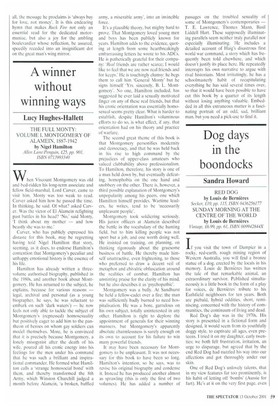A winner without winning ways
Lucy Hughes-Hallett
THE FULL MONTY: VOLUME I, MONTGOMERY OF ALAMEIN, 1887-1942 by Nigel Hamilton Allen Lane/Penguin, £25, pp. 901, ISBN 0713993340 When Viscount Montgomery was old and bed-ridden his long-term associate and fellow field-marshal, Lord Carver, came to visit him. Monty was too weak to read. Carver asked him how he passed the time. In thinking, he said. Of what? asked Carver. Was the victor of El Alamein refighting past battles in his head? 'No,' said Monty, 'I think about my mother — and how beastly she was to me.'
Carver, who has publicly expressed his distaste for this book, may be regretting having told Nigel Hamilton that story, seeming, as it does, to endorse Hamilton's contention that Montgomery's peculiar and unhappy emotional history is the essence of his life.
Hamilton has already written a threevolume authorised biography, published in the 1980s, and another book about Montgomery. He has returned to the subject, he explains, because for various reasons — legal, archival and personal (as a young biographer, he says, he was reluctant to embark on such 'dark waters') — he now feels not only able to tackle the subject of Montgomery's (repressed) homosexuality but positively eager to add him to the pantheon of heroes on whom gay soldiers can model themselves, More, he is convinced that it is precisely because Montgomery, a lonely misogynist after the death of his wife, poured all his erotic energy into his feelings for the men under his command that he was such a brilliant and inspirational commander. He formed what Hamilton calls a 'strange homosocial bond' with them, and thereby transformed the 8th Army, which Winston Churchill judged a month before Alamein, 'a broken, baffled army, a miserable army', into an invincible force.
It's a plausible theory, but mighty hard to prove. That Montgomery loved young men and boys has been publicly known for years. Hamilton adds to the evidence, quoting at length from some heartbreakingly embarrassing letters he wrote to his ADCs. He is pathetically grateful for their company: 'Real friends are rather scarce; I would like to feel that we are now real friends and for keeps.' He is touchingly clumsy: he begs them to call him 'General Monty' but he signs himself 'Yrs. sincerely, B. L. Montgomery.. No one, Hamilton included, has suggested he ever laid a sexually motivated finger on any of these real friends, but that his erotic orientation was essentially homosexual seems pretty clear. What is harder to establish, despite Hamilton's voluminous efforts to do so, is what effect, if any, that orientation had on his theory and practice of warfare.
The second great theme of this book is that Montgomery personifies modernity and democracy, and that he was held back in his rise to high command by the prejudices of upper-class amateurs who valued clubbability above professionalism. To Hamilton, therefore, his story is one of a man held down by, but eventually defeating, homophobia on the one hand and snobbery on the other. There is, however, a third possible explanation of Montgomery's unpopularity among his peers, one which Hamilton himself provides. Wartime leaders, he writes, tend to be 'necessarily unpleasant people'.
Montgomery took soldiering seriously. His junior officers at Alamein described the battle in the vocabulary of the hunting field, but to him killing people was not sport but a job, and one worth doing well. He insisted on training, on planning, on thinking rigorously about the gruesome business of battle. He thereby made himself unattractive, even frightening, to those who preferred to draw a decent veil of metaphor and chivalric obfuscation around the realities of combat. Hamilton has unstinting praise for the clarity of his mind, but he also describes it as 'psychopathic'.
Montgomery was a bully. At Sandhurst he held a fellow-cadet over a fire: the man was sufficiently badly burned to need hospitalisation. He was a bore, garrulous on his own subject, totally uninterested in any other. Hamilton is right to deplore the appointment of generals for their winning manners, but Montgomery's apparently absolute charmlessness is surely enough on its own to account for his failure to win many powerful friends.
It may have been necessary for Montgomery to be unpleasant. It was not necessary for this book to have been so long. Hamilton's intention, so he says, was to revise his original biography and condense it. Instead he has produced another almost as sprawling (this is only the first of two volumes). He has added a number of
passages on the troubled sexuality of some of Montgomery's contemporaries — T. E. Lawrence, Thomas Mann, Basil Liddell Hart. These supposedly illuminating parallels seem neither truly parallel nor especially illuminating. He includes a detailed account of Haig's disastrous first world war command, a story which has frequently been told elsewhere, and which doesn't justify its place here. He repeatedly interrupts his own narrative to argue with rival historians. Most irritatingly, he has a schoolmasterly habit of recapitulating everything he has said several times over, so that it would have been possible to have cut this book by a quarter of its length without losing anything valuable. Embedded in all this extraneous matter is a fascinating portrait of an odd, sad, brilliant man, but you need a pick-axe to find it.


























































































 Previous page
Previous page